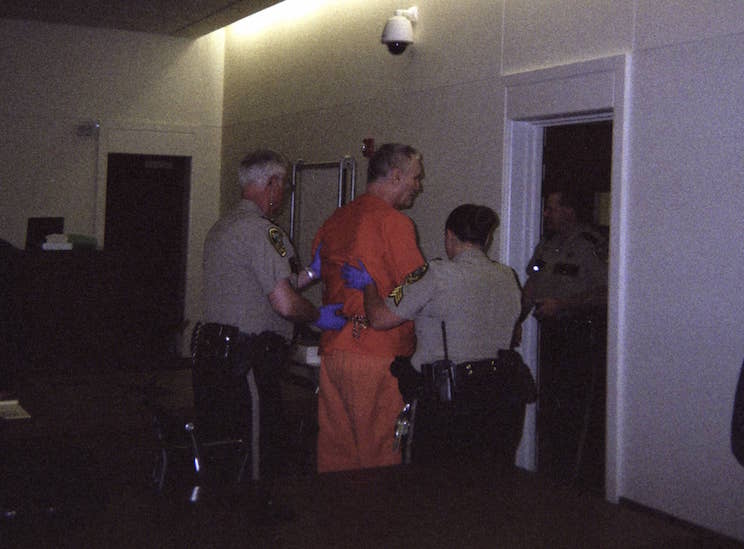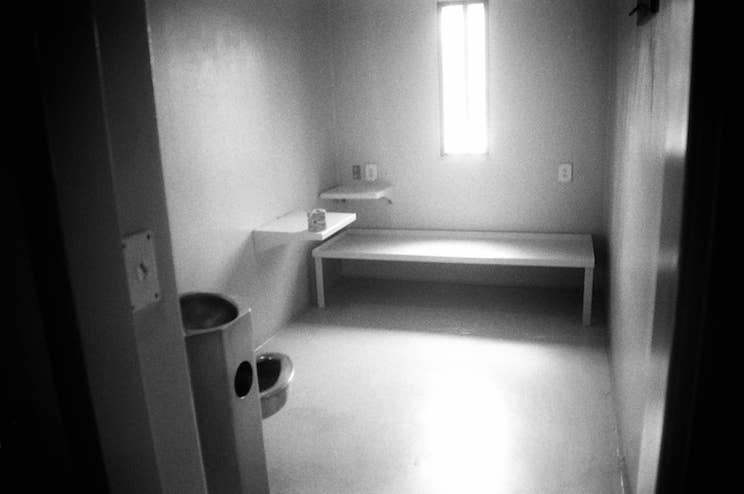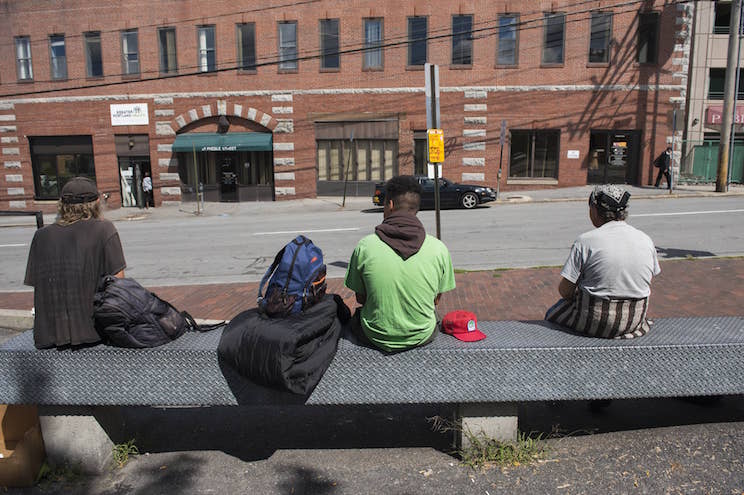In April, while incarcerated at the Maine State Prison’s Intensive Mental Health Unit in Warren, James Staples removed his own eyeball.
The 66-year-old prisoner, who has a lengthy history of both mental illness and assault and had previously been incarcerated at many of the state’s mental health treatment centers, tried unsuccessfully to remove his other eye with his fingernails. Nonetheless, he managed to render himself blind.
For Maine’s mentally ill, things were not supposed to be like this.
In 1989, after ten patients died from deficiencies in the care provided to them at the Augusta Mental Health Institute (AMHI), patient advocates sued the state and the following year achieved a sweeping legal settlement known as the “consent decree.” This 99-page document ordered what is now named the Department of Health and Human Services to create a decent, robust system to care for Maine’s seriously mentally ill citizens — and to do it within five years. The Department agreed.
But 27 years later, law enforcement officials, mental health experts and patient advocates agree that the state is still far from meeting the consent decree’s mandates. Despite the decree’s strict requirements, the shortcomings of the state’s mental health system include:
• Potentially tens of thousands of seriously mentally ill adults in Maine, many of whom wander the streets of the state’s cities or languish in the jails and prisons, may have had insufficient care or have had little or even no contact with the state’s mental health treatment system.
• Treatment is critical — but lacking in Maine. While seriously mentally ill people are no more dangerous than other people if they get proper treatment, the untreated are three to four times more likely to commit violent acts than members of the general population. This is why law-enforcement officials have been so upset with — and for so long — the inadequacy of the care the mentally ill receive.
• The consent decree is essentially an unfunded mandate. It doesn’t require the Legislature to appropriate money for mental health care, and advocates generally agree that state government’s refusal to provide enough funding underlies many problems in the treatment of Maine’s mentally ill. Exacerbating insufficient funding by previous administrations, Gov. Paul LePage has cut 13,000 patients from mental health care in the last five years.
• Treatment facilities are insufficient. Officials admit that Riverview Psychiatric Center in Augusta, the county jails, and the Maine State Prison’s mental health unit are unable to treat or even control especially violent patients. Instead, the institutions tend to transfer them from one to another in a “diagnosis game.”
• Solutions are inadequate. Special courts keep up to 250 mentally ill people out of jail and prison, but they only serve those already in trouble with the law. And critics claim that the major mental health care advocacy groups, which get considerable funding from the state and federal governments, have an inherent conflict of interest and don’t aggressively work to increase and improve community care or change the way institutions like Riverview administer services.
A History of Neglect
According to the terms of the 1990 consent decree, treatment in the mentally ill person’s own city or town was to be emphasized. Crisis intervention, housing, transportation, vocational, recreational and social needs would be met. The individual being treated would have a big voice in his or her own care and have an opportunity to help design Maine’s entire system of care, which was to be well-monitored.
In contrast to the prison-type approach that had been used at AMHI, there would be humane, respectful and safe institutional care, with restraints and seclusion greatly reduced and medical and dental needs met.
But as Staples’ self-mutilation incident shows, as well as countless other incidents related by law enforcement and mental health professionals, Maine has never been able to adequately treat mentally ill people, despite the consent decree’s specific instructions and deadline.
Maeghan Maloney, the Kennebec and Somerset County district attorney, tells of a man with no criminal record who was having mental health problems and went to the hospital to ask for help. He was diagnosed as schizophrenic and given prescriptions for medicine.
“Well, they were pieces of paper,” she said. The young man didn’t have the money to get them filled. He got worse, returned to the hospital, and was given prescriptions again. But he still couldn’t afford them.
“A few weeks later, his mental condition deteriorated and this time he used alcohol, and in the middle of the night went to the home of a 73-year-old woman,” where he brutally raped her, she said.

Maloney pointed out that in addition to the horror of the assault on the woman, it wasn’t cost-effective for taxpayers to have a mental health system that didn’t properly take care of this man.
“So now he’s been sentenced to 28 years in prison,” she said. “Twenty-eight years times $45,000 a year — which is the cost of being in the Maine State Prison — is $1,260,000.”
Pamela Ames, the man’s defense attorney, said in an interview that her client, Mark Halle of Waterville, was unemployed, broke but technically able-bodied, so he didn’t qualify for most MaineCare benefits. MaineCare is the state’s name for Medicaid, the two-thirds-federal, one-third-state fund that pays for health care for poor and disabled people. “There’s a big hole in the system,” she said.
Maloney told her story at a day-long forum in June on “The Criminalization of the Mentally Ill,” held by the Maine Advisory Committee to the U.S. Commission on Civil Rights in the Lewiston City Council chambers.
From hard-nosed representatives of law enforcement to pleading parents of mentally ill prison inmates, speakers overwhelmingly agreed that Maine’s mental health care system is “shattered” — the word used by both Michael Sauschuck, Portland’s police chief, and Penobscot County’s sheriff, Troy Morton. They agreed that jails and prisons, where many seriously mentally ill people wind up, are usually the wrong places for them.
Chief Sauschuck and others described a chain of events that untreated serious mental illness can lead to: homelessness, small-scale and then violent criminal activity, and then incarceration — and re-incarceration — in jail, prison or mental hospitals.
Tens of Thousands Overlooked
The Statewide Homeless Council announced in July that last year about 6,300 people stayed in homeless shelters, for a total of 327,000 nights. But Mark Swann, director of Preble Street, a Portland bursting-at-the seams homeless shelter system, sharply criticized this number as not painting the full picture. It didn’t take into account, he said, people turned away from shelters and sleeping outside.
“I’ve never seen the numbers of people sleeping outside in Portland,” said Swann, who has worked at Preble Street for 26 years. “Things are just horrible and tragic.”
The federal Housing and Urban Development Department’s 2016 survey showed that 42 percent of the homeless in Maine have severe mental illness. Nationally, that number is 20 percent.
Four percent of all adult Americans are seriously mentally ill, the National Institute of Mental Health said in 2009. If that holds for Maine, the state has about 42,000 people suffering from serious mental illness. Yet there were only 10,534 people identified by the state as having “severe and persistent” mental illness as of March and thereby qualifying for full mental health care benefits, according to Daniel Wathen, the court system’s “special master” charged with enforcing the consent decree.

(The terms “seriously mentally ill” and “severely mental ill” tend to be used interchangeably in psychiatric literature. Neither of the terms is used in the MaineCare regulations that determine who gets services through the consent decree, nor is “severe and persistent.”)
Therefore, potentially as many as 31,000 of Maine’s most mentally ill do not get fully treated or even get involved with the treatment system. One of the reasons for that is strictly financial: 70 percent of people using Preble Street’s day shelter and 1,000-meals-per-day soup kitchen don’t have any kind of health insurance, said Bill Burns, the organization’s health services director.
Wathen agreed that Maine’s system of care “is not reaching all the people who have mental health problems,” such as the “jail population and the street population.”
Treatment is Key
There is general agreement that treatment is important in keeping seriously mentally ill people from committing violent acts.
A 2016 compilation of studies by the Treatment Advocacy Center states: “No evidence suggests that people with serious mental illness receiving effective treatment are more dangerous than individuals in the general population.” Almost all violent acts by the mentally ill are committed by individuals not being treated, “many of them also abusing alcohol or drugs.”
The studies go on to show that if left untreated, seriously mentally ill people commit acts of violence at around three to four times the rate of the general population.
Burns tells of one man frequenting a shelter who, in four years, had 144 “contacts” with the police and had been in Riverview three times. Another, a very young man, was discharged directly from Riverview to Portland’s city-run Oxford Street Shelter without a medication-management or housing plan. He was transferred quickly to Preble Street’s teen shelter, where within days he became threatening and violent. The police had to “tase” him five times in the shelter’s courtyard.
“We’ve got an awful lot in common with the police,” Preble Street’s Swann remarked. “We consider them our peers in doing ‘front-line’ work.”
Jail, Prison Deficiencies
The nation’s well-known turn to mass incarceration in the last 40 years has paralleled closely the equally famous “de-institutionalization” of the mentally ill from the old, huge mental hospitals. A 2015 report by the Vera Institute of Justice, “Incarceration’s Front Door,” describes how, nationally, those coming into the jails — frequently, not for the first time — tend to be mentally ill, addicted to illegal drugs, homeless, and poor. According to another Treatment Advocacy Center study, by 2014 there were ten times more mentally ill people in prisons and jails (383,000) than in state psychiatric institutions (38,000).

At the Lewiston forum, Sheriff Morton said his jail has become “the largest mental health detoxification center in northern Maine.” The jail technically has a capacity of 157 inmates, but on that June day there were 193 in custody.
The federal Substance Abuse and Mental Health Services Administration (SAMHSA) reported in 2011 that nationwide around 80 percent of prison and jail inmates had either mental health or substance abuse problems and 41 percent of state prisoners and 48 percent of jail inmates had both.
In Maine, overburdened sheriffs try to send their most violent mentally ill inmates to the state prison’s Intensive Mental Health Unit (IMHU), even though these people may have only been charged with, rather than convicted of, a crime.
The prison has its own sizeable resident population of mentally ill inmates. Corrections Commissioner Joseph Fitzpatrick, a clinical psychologist, said more than 40 percent of prisoners take psychotropic medicine.
The prison has long been plagued by suicide attempts, grisly self-injury, prisoner-on-prisoner assaults, and the occasional successful suicide or murder. In the prison’s mental health unit in 2013, one inmate, Guy Hunnewell, killed another, Alan Powell, by smashing him repeatedly with an electric guitar.
Other state lockups have similar problems. Last year in the Long Creek youth prison in South Portland a very mentally ill 16-year-old boy, Charles Maisie Knowles, hung himself. A Corrections Department report earlier this year noted that 85 percent of the young people at Long Creek had three or more mental-illness diagnoses and that a similar number had substance-abuse histories.
The IMHU has begun admitting that it can’t deal with some violent people and has started sending them to a national infirmary for mentally ill prisoners 1,000 miles from Maine: the Columbia Regional Care Center in South Carolina.
In the Mental Hospitals
The consent decree made a special effort to correct the horrors of AMHI, which once held 1,800 people, many committed for years or even decades with little or poor treatment. The state’s secondary mental hospital, the Bangor Mental Health Institute — now called Dorothea Dix Psychiatric Center — once held 1,100 inmates in similar conditions. (The facility was renamed for Hampden native Dorothea Dix, who 150 years ago launched the international movement to take the mentally ill out of the jails and treat them as sick people.)
With only 92 beds at Riverview — roughly half for “forensic patients,” those placed there by a court — state officials admit that it is not large enough to treat all the people who need its intensive care. Dorothea Dix has around 45 patients who need less-intensive care, but in the last couple of years, up to 30 of those have been forensic patients, an overflow from Riverview.

Riverview in recent years has been beset by staff turmoil — high vacancies, high turnover, and leadership changes — as well as violence by patients against other patients and staff. One patient over the last decade committed at least ten assaults on staff and patients.
And largely because the institution treated some patients as if they were prison inmates, with guards using stun guns and pepper spray on them, the federal government in 2013 decertified it as eligible for federal mental-hospital funding.
That resulted in the loss of millions of dollars a year for Maine and, this year, a bill from federal authorities for $51 million that the federal government says the LePage administration improperly spent.
Like the prison, Riverview has begun sending some violent patients it cannot control — after charging them with a crime — to South Carolina.
The “Diagnosis Game”
Staples’ story of self-harm illustrates how community and institutional deficiencies in mental health care are intertwined.
For some time a “street person” in Bangor, Staples, 66, has a long history of insanity and assaults. In 2015, after attacking staff at Bangor’s Acadia Hospital, a private mental health facility, he was taken to the Penobscot County jail, eventually found mentally incompetent to stand trial and committed to Riverview.

According to Bangor police reports, in justifying his discharge Acadia staff said his “treatment was complete,” his assaults were “behavioral not psychological,” and he had chosen not to control his violent outbursts — though Acadia also told police he had several serious psychological diagnoses.
After Staples attacked a Riverview patient early this year, he was taken to the Kennebec County jail, where he continued to be combative. As recounted in a police report, Riverview’s staff sent him to jail using nearly the same justifying language as Acadia’s had used: His actions were “volitional and not related to his mental illness.”

The language that both Riverview and Acadia expressed is typically “a way for mental hospitals to shift responsibility for violent mental patients to the criminal justice system,” said a prominent national prisoner advocate, Chicago attorney Alan Mills, who calls it the “diagnosis game.”
Kim Moody, who directs Disability Rights Maine, the “protection and advocacy agency” for disabled people, said her group believes individuals “should not be charged with crimes for behaviors for which they were ordered to receive treatment in the very hospital that is now charging them with assault for those very behaviors for which the hospital is responsible for treating.”
Wathen, the former chief justice of the Maine Supreme Judicial Court, said it’s not always so simple: “It’s not inconceivable that some people in Riverview are capable of forming criminal intent” at some stage in their recovery.
‘Shameful’ Care
Staples’ journey is well-documented. From the Kennebec County jail he was sent to the maximum-security prison’s Intensive Mental Health Unit, where he attacked his eyes.
Three months later, the now-blind man was haltingly led before Superior Court Justice Michaela Murphy in Augusta to have his future decided. Justice Murphy accepted his “not criminally responsible by reason of insanity” plea for his Riverview actions and saw him shipped off to South Carolina.
Staples explained his actions to the judge: “God was telling me for my health to perform these acts” or “I’ll lose my soul.”
A Riverview psychiatric nurse practitioner, Miriam Davidson, testified candidly that the facility couldn’t use the special restraints needed for Staples because it was trying to win back federal certification as a mental hospital.
A frustrated Justice Murphy had two words to describe the inability of any Maine institution to take care of Staples: “serious” and “shameful.”








